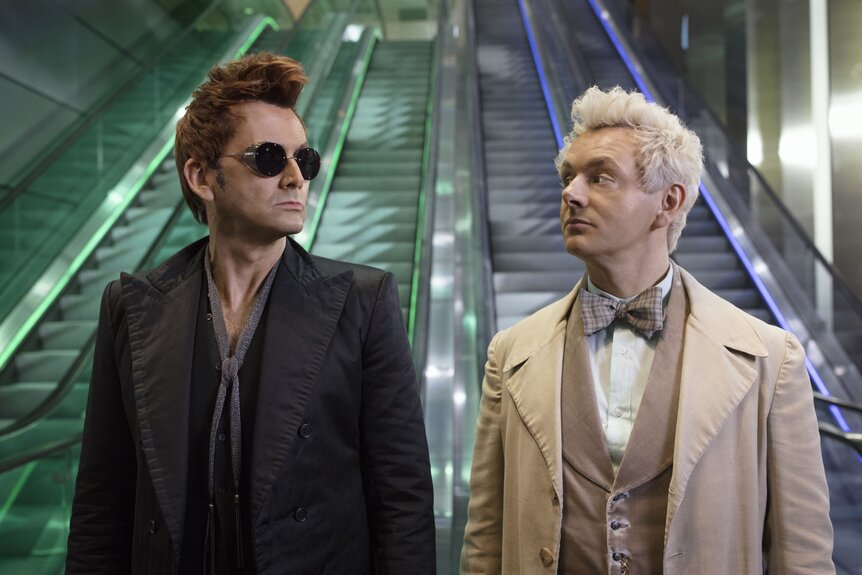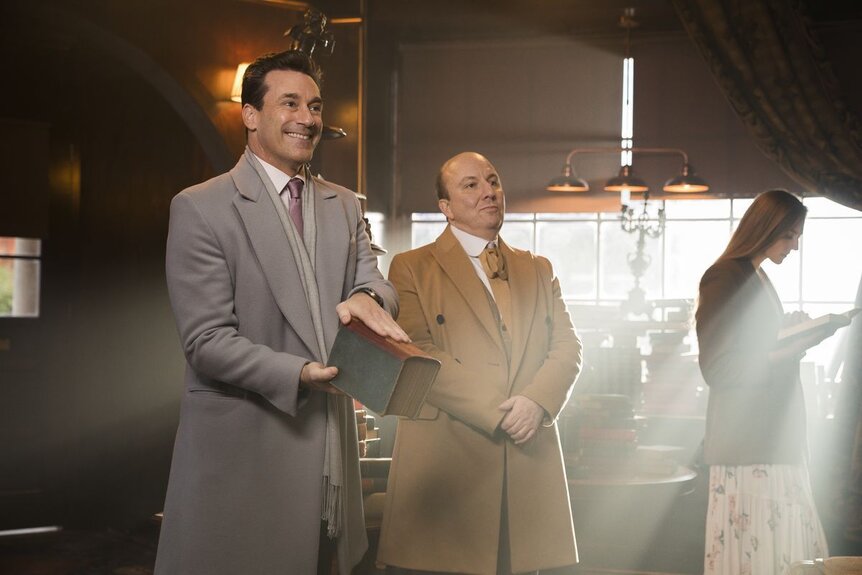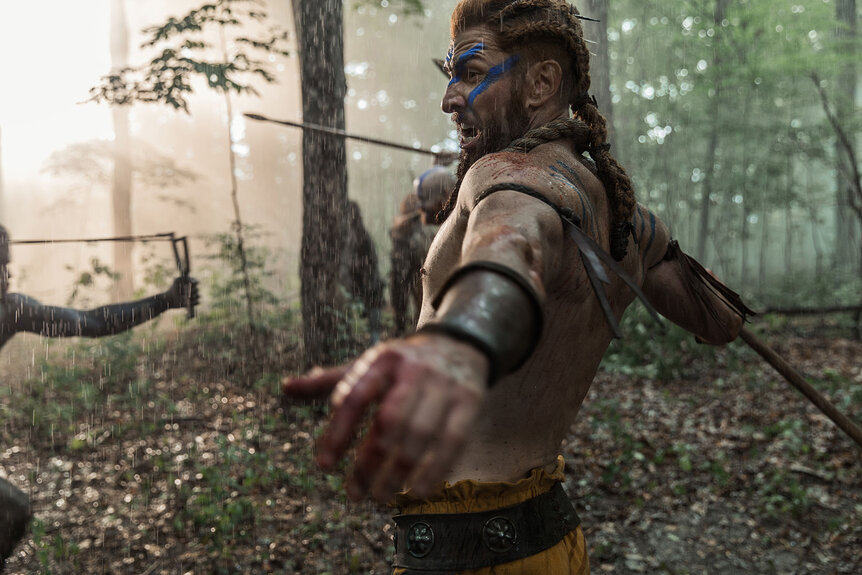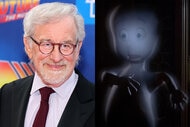Create a free profile to get unlimited access to exclusive videos, sweepstakes, and more!
Neil Gaiman reveals why American Gods and Good Omens will be his last TV gigs for a while
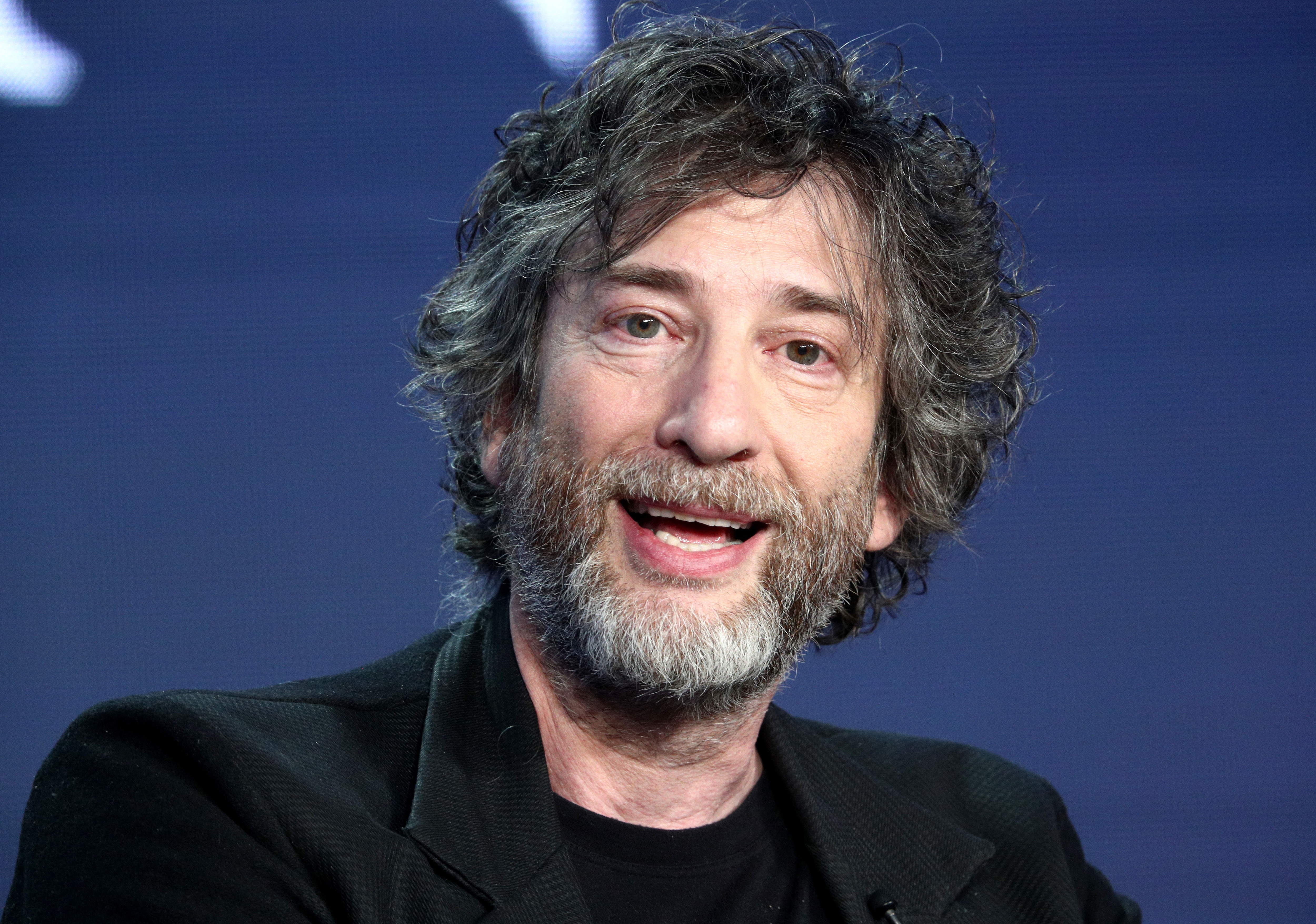
For the better part of four decades, Neil Gaiman's been known to the world as a writer: comics, radio plays, screenplays, novels, he's penned them all. But in recent years, as his print works have been increasingly optioned and adapted — especially for television — Gaiman's dipped his toe into the world of showrunning.
With American Gods, he picked Bryan Fuller (Pushing Daisies) as showrunner, who then brought on Michael Green (Heroes) for Season 1. When Amazon ordered Good Omens as a limited series, Gaiman wasn't ready for someone else to bring his vision to life, so he took on the showrunner role, working closely with executive producer/director Douglas Mackinnon.
With that choice, Gaiman's life for especially the last year has been one of location shoots, and sitting in dark rooms watching episode edits, instead of scrawling new stories onto the page. As he sits nursing a hot tea, contemplating the second season debut of American Gods on Starz and Good Omens premiering on Amazon in May, he is confident when he tells SYFY WIRE that in the near future, "I'm gonna be a retired showrunner. And in my retirement, I'm thinking about taking up writing."
"I woke up about four days ago and there was a short story in my head," he continues. "And I thought that actually hasn't happened for two years, just because all of my attention has been on budget, and the VFX, and the edit and the sound mix. So, it was like, 'Great, apparently I can still do that. That's nice.' And I think, honestly, the most important thing about having been a real showrunner is, it's gonna make me a lot harder to bulls*** from showrunners and others."
What Gaiman has now intimately learned is the omnipotence of solitarily writing his prose is the polar opposite of the demands of showrunning his adapted words to a visual medium. He explains, "With Good Omens, what we didn't have were really producers, or the showrunner, director, producer triangle. We were kind of producer-less for most of it. We would get short-term producers who would see us through, pass the baton to the next producer and go away, so there was no consistency. What it wound up meaning was that Douglas and I wound up essentially wearing the producer hat and doing the producer job. And that meant that I had a crash course in the [visual] effects, a crash course in sound mixing, a crash course in graphics, a crash course in what happens in the edit, a crash course in how to do breakdowns; all of this stuff that I, honestly, normally would expect diligent gnomes to take care of," he smiles.
"But there were no diligent gnomes," he continues with a sigh. "There was just me and Douglas, so we did everything. When you consider that we wrapped major photography on Good Omens the first week of March of last year, basically, we spent 11 months sitting very near each other on a sofa in the same room. We were watching things and saying 'yes' and saying 'no,' and just making sure that only one of us ever was grumpy at the same time because it didn't work if we were both grumpy."
And what did the writer learn about the art of showrunning? Gaiman muses, "Mostly, the biggest thing I learned was you make every show three times. You make it when you write it, you make it when you shoot it, and then you make it in the edit. And also, you make it, these days, in the effects. One thing that American Gods and Good Omens both have in common is they only come together right at the very end. That's really hard for people to understand and it's really hard for people even to give notes because…with the effects, you know, we have Satan coming up out of the ground, but you can't see it. Everybody simply has to have faith. And that is really f***ing weird."
Speaking of American Gods, that series was gearing up for its second season during Good Omens production, and there was much turmoil. As reported by The Hollywood Reporter, Bryan Fuller and Michael Green left the series due to budget and creative differences, opening the door for Jesse Alexander to come in and take the showrunner reins.
As Gaiman tells it, he learned of the Fuller/Green exit in December 2017 while shooting Good Omens in Bovingdon, England. "We were on a disused airfield when I learned that Brian and Michael had, for whatever reasons, moved on and moved off, so then I wound up having to get involved in finding a new showrunner."
During a hiatus in Good Omens shooting before the production relocated to South Africa, Gaiman says he traveled to New Orleans to be with his family for a week, and Alexander flew to discuss Season 2 with him. "We talked through what needed to happen in this season, and [then] set him to work. The idea was always that we would basically begin at The House on the Rock and end on the way to Lakeside. That was always the shape of Season 2, and what happened in there was kind of up to Jesse," Gaiman details.
"And then I was again lucky because when we finished shooting in South Africa, I had a few weeks off before we started the edit and it coincided with Jesse having done the first draft of the first episode," he explains. "But, you know, he had never been to The House on the Rock and he had never written for any of these characters so it was one of these things where I said, 'Look, would it be easier if I just do a rewrite of yours for dialogue and shape?'" That's how Gaiman came to write the Season 2 premiere, which is the only episode he penned for the sophomore season. "I got to have a little voice in Episode One," Gaiman offers, "And then I disappeared into the Good Omens edit."
Gaiman says Alexander ran the show day-to-day, and he only read script and provided notes for the bulk of the season until episode seven. "I got more involved with that particular episode because I was out in Toronto for a few days getting to catch up with the [Gods] cast, getting to see what was going on." The episode, "Treasure of the Sun" was scripted writer/co-executive producer, Heather Bellson, and it was about the back story of Mad Sweeney. Gaiman was sitting on unused backstory he created for the character and handed it off to Bellson. "I loved the fact that Episode Seven of the first season ["A Prayer for Mad Sweeney"] got to be about the Mad Sweeney of the past," Gaiman enthuses. "And now Episode Seven of this [year], gets to be a huge one for Mad Sweeney."
Now, with both adaptations on the precipice of release, and the work to make them behind him, Gaiman is able to reflect on how these two stories from his literary back catalog are now front and center in the television narrative landscape.
"I think the weirdest thing for me, and the best thing, about both American Gods and Good Omens is just how peculiarly timely these things from my youth have become," he offers. "I'm used to being timeless, I'm not used to being timely. And I'm definitely not used to doing a show. When I wrote American Gods, the idea of depicting America as an immigrant nation, mostly inhabited by people who came here from other places over the last 20,000 years, and brought things with them, that didn't seem contentious.
"And in the same way, the narrative of Good Omens, [is saying] that it is infinitely superior to not fight a war than to win a war. Terry [Pratchett] and I did not think that was a strange thing to say. When we wrote the book, it was 1989, the Berlin Wall would come down, and Glasnost was happening. The world was sort of in this place where the idea of Armageddon seemed a bit weird. And now, in this time of global idiocy, Armageddon wasn't meant to be something that we are checking our watches to make sure it doesn't happen before the show gets launched."
American Gods Season 2 commences on March 10 and Good Omens debuts on May 31.
